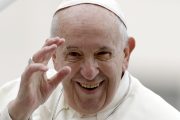
The old line goes like this — “There’s good news and there’s bad news.” Unfortunately, sometimes the bad news is that the good news was undone. Such is the case with the back-and-forth Kansas ban on religious services under the pretext of the COVID-19 pandemic. On Saturday, the Kansas Supreme Court ruled in favor of Democrat Governor Laura Kelly, allowing her executive order forbidding religious services for more than 10 people to stand.
In a previous article, this writer had reported that Kelly’s order had been overturned by that Midwestern state’s AG and Legislative Coordinating Council due to the order violating the state constitution. As that article explained, Kelly immediately threatened a lawsuit, blasting the AG and calling the overturning of her executive order “overtly political” and “an unnecessary distraction.” She asked the court to expedite a ruling in her favor.
Kelly’s suit was filed Friday, and the court was more than obliging to her case. On Saturday, the court overturned the AG and the Legislative Coordinating Council. Ignoring the constitutional principles involved, the court is allowing Kelly’s suppression of religion to stand.
As Talking Points Media is reporting:
In an expedited decision made just one day after Kelly sued, the Court delivered a very narrow ruling pertaining only to the authority of the standing legislative council to revoke Kelly’s order. It did not grapple with the larger questions of religious freedom or public health.
Some argue that such orders — in force in almost every state — are not a form of religious suppression. But businesses — including grocery stores, electronic stores, liquor stores (owned by the government in many states) and abortion clinics — are allowed to stay open because they are deemed “essential.” The disparity with which churches and other religious places are being treated is clear evidence of suppression — if not actual persecution.
As this writer stated in a previous article about a Virginia pastor being criminally charged for holding a service for 16 people in a building that seats nearly 300:
While businesses all over Virginia have continued to operate without any threat of police action, churches and other religious congregations have been deemed “non-essential” and are forbidden to meet. By contrast, this writer ran out to the grocery store recently and had to circle the parking lot to find a parking space. As an aside, I had less luck finding toilet paper.
That store was crowded — with at least 150 people milling around the store. But a pastor, who dares to minister to 16 people, is issued a summons. The incongruity is based in the liberal view of the value of religion. Because of the liberal worldview held by the Democrat leadership in Virginia, grocery stores are (correctly) considered “essential” while churches are not.
After listing the charitable work done by not only that church in Virginia, but by most churches, that article goes on to state:
Besides the innate value of religion to society — understood and promulgated by generations of Americans, including the Founding Fathers — there is the salient fact that the charitable work provided by this and other churches is absolutely “essential” to those who receive it. But, a government run by people who can’t see the value of religion is not likely to see the charity of a church as anything other than competition.
Government is often mocked for its inefficiency, but in this case, the Kansas Supreme Court acted with extreme efficiency to trample the rights of church-goers. Perhaps the issue was never one of efficiency, but of priorities.
This decision by the Kansas Supreme Court allows Kelly’s order to stand. That order allows the arrest and prosecution of ministers and congregants who violate the order by attending services if more than 10 people are present — with no exceptions made for other factors.
But a Kansan can still shop in crowded stores for printer paper, televisions, frosted donuts, and sporting goods without threat of arrest. A Kansan can shop in a crowded liquor store or even go to a bar without fear of arrest. A Kansan can visit a crowded abortion clinic and obtain an “elective surgery” to kill her unborn child without threat of arrest. But if a Kansan attends a religious service with even 11 people present and spread out widely across a building that seats hundreds, they all face arrest and prosecution.
That is the very definition of religious suppression by the state.
Image: rarrarorro/iStock/Getty Images Plus
C. Mitchell Shaw is a freelance writer and content creator who focuses on matters related to the Constitution and liberty. A privacy nerd since before it was cool, he hosts and produces the Enemy of the [Surveillance] State podcast.






